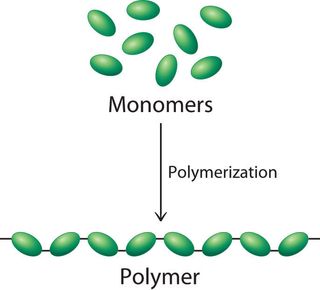Polymers in Construction: Stronger, Lighter, and More Durable
Polymers in Construction: Stronger, Lighter, and More Durable
Blog Article
Checking Out the Varied Applications and Benefits of Polymers in Different Industries
Polymers, with their diverse range of buildings and performances, have become crucial in various industries, each enjoying one-of-a-kind benefits from their application. Polymers. From improving safety and security and performance in the vehicle sector to transforming medical devices in the healthcare market, polymers play a crucial duty. Their environment-friendly nature is modifying the landscape of sustainability methods. As we explore the depths of polymers in electronics, we reveal advanced advancements, while their architectural integrity changes the world of construction and facilities. The prevalent impact of polymers throughout sectors is a testament to their adaptability and flexibility, shaping the future of countless fields.
Automotive Industry Applications
Polymers play a crucial role in enhancing the efficiency and durability of numerous elements within the automotive field. These flexible products are thoroughly made use of in the manufacturing of different parts, varying from indoor components to under-the-hood applications. One popular use polymers in the automobile industry remains in the manufacturing of lightweight parts. By replacing standard steel get rid of polymer-based options, cars can attain improved gas efficiency without compromising on strength or safety.

Health Care Market Advantages
In various health care applications, the advantages of utilizing polymers are widely recognized for their diverse series of valuable properties. Polymers play an important function in the medical care market due to their versatility, biocompatibility, and cost-effectiveness. Among the main advantages of polymers in medical care is their capability to be tailored to certain requirements, such as flexibility, toughness, and biodegradability, making them suitable for a large range of clinical applications.
Polymer-based products are extensively used in clinical tools, such as catheters, implants, prosthetics, and medication delivery systems, as a result of their biocompatibility and capability to simulate natural cells. These materials can decrease the threat of sensitive responses or beings rejected, boosting person safety and security and outcomes. Additionally, polymers are light-weight, making them appropriate for wearable clinical tools and ensuring patient convenience.
Additionally, polymers make it possible for the development of ingenious treatment techniques, such as hydrogels for tissue engineering and nanocomposites for targeted medication distribution. Their convenience of processing and sterilization makes next them necessary for keeping high standards of hygiene in healthcare setups. In general, the diverse benefits of polymers add significantly to improvements in clinical innovation and person treatment.
Ecological Advantages of Polymers

Furthermore, polymers can contribute to power financial savings due to their lightweight nature. In industries such as transport, light-weight polymer materials can help in reducing fuel usage and greenhouse gas discharges. In addition, polymers can make it possible for the development of energy-efficient products such as insulation materials that enhance energy conservation in structures.
Moreover, polymers play a critical function in minimizing water contamination. The use of polymer-based filtering systems can successfully get rid of contaminants and impurities from wastewater, securing water sources and environments. On the whole, the environmental benefits of polymers make them useful properties in advertising sustainability and environmentally friendly practices across numerous industries.
Polymers in Electronic Devices and Innovation
Taking into consideration the raising demand for ingenious and sustainable services in modern-day sectors, the combination of sophisticated polymer technologies in the world of electronics and technology has become a crucial technique for driving efficiency and performance. Polymers have transformed the electronics industry by allowing the manufacturing of lighter, extra adaptable, and resilient digital tools. From smartphones to clinical gadgets, polymers play a critical function in boosting item style and capability.
One significant benefit of polymers in electronic devices is their protecting homes, which help protect delicate digital parts from ecological variables and electrical interference. In addition, polymers are important in the development of flexible display screens, wearable technology, and published electronic devices, offering endless opportunities for developing wise and interconnected gadgets.
Furthermore, using polymers in digital packaging has actually caused improvements in miniaturization and thermal monitoring, enhancing the general efficiency and integrity of electronic systems. As modern technology remains to develop, the flexibility and versatility of polymers will undoubtedly drive better technology in the electronic devices market, forming the future of modern technology.
Role of Polymers in Building And Construction and Framework
Polymers provide many benefits in the construction sector due to their adaptability, resilience, and cost-effectiveness. One key function of polymers in building and construction is their usage in coverings and sealers, giving security versus ecological aspects such as wetness, UV radiation, and corrosion.
Additionally, polymers play a critical duty in sustainable building and construction methods by allowing the growth of energy-efficient structures. Shielding products made from polymers aid regulate interior temperatures, decreasing the need for heating and cooling systems and eventually decreasing energy intake. Additionally, the use of polymer-based compounds in framework projects such as bridges and roads improves their longevity and lowers upkeep expenses. In general, the consolidation of polymers in construction and facilities displays their significant effect on contemporary engineering techniques.
Verdict
To conclude, polymers play a crucial role in different industries such as auto, health care, ecological, electronic devices, and building and construction. Their versatile buildings make them important in developing ingenious remedies and items. From enhancing fuel performance in cars to enhancing clinical tools, polymers provide countless advantages. Furthermore, their influence on reducing waste and advertising sustainability highlights their value in modern applications. The extensive use polymers internet shows their considerable contribution to progressing technology and improving quality of life.
Report this page